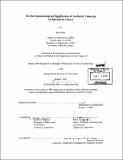| dc.contributor.advisor | Stanford Anderson and Mark Jarzombek. | en_US |
| dc.contributor.author | Bhatt, Ritu | en_US |
| dc.contributor.other | Massachusetts Institute of Technology. Dept. of Architecture. | en_US |
| dc.date.accessioned | 2011-06-20T15:48:48Z | |
| dc.date.available | 2011-06-20T15:48:48Z | |
| dc.date.copyright | 2000 | en_US |
| dc.date.issued | 2000 | en_US |
| dc.identifier.uri | http://hdl.handle.net/1721.1/64548 | |
| dc.description | Thesis (Ph.D.)--Massachusetts Institute of Technology, Dept. of Architecture, 2000. | en_US |
| dc.description | Includes bibliographical references (p. 127-130). | en_US |
| dc.description.abstract | This dissertation examines the epistemological significance of "truth," "rationality," and the "aesthetic" first in the nineteenth-century definitions of the nature of Gothic and, then in more recent twentieth-century debates about objectivity. My study links the Aristotelian notion of practical reasoning to aesthetic cognition, and brings to surface the scientific, moral, and ethical arguments, which have been ignored by contemporary architectural criticism. The theoretical foundation of my argument lies in the work of analytic philosophers and literary theorists such as Hilary Putnam, Nelson Goodman and Satya P. Mohanty. These writers emphasize the rational and affective nature of our aesthetic experience and our aesthetic values and judgments, and propose a sophisticated account of objectivity by reexamining the actual nature of the "hard" sciences, interpreting them as complex, coordinated social practices. By drawing upon this understanding of objectivity, particularly as it relates to politics, I hope to bring to light a theoretical alternative to post-modernism in architecture that can enable us to explain the relationship of architecture to political power without abandoning the values of aesthetics, truth or rationality. My dissertation mediates between the disciplines of philosophy, literary theory, and architecture and tries to create space for inquiry wherein the epistemological, the theoretical, and the historical are interconnected. | en_US |
| dc.description.statementofresponsibility | by Ritu Bhatt. | en_US |
| dc.format.extent | 130 p. | en_US |
| dc.language.iso | eng | en_US |
| dc.publisher | Massachusetts Institute of Technology | en_US |
| dc.rights | M.I.T. theses are protected by
copyright. They may be viewed from this source for any purpose, but
reproduction or distribution in any format is prohibited without written
permission. See provided URL for inquiries about permission. | en_US |
| dc.rights.uri | http://dspace.mit.edu/handle/1721.1/7582 | en_US |
| dc.subject | Architecture. | en_US |
| dc.title | On the epistemological significance of aesthetic values in architectural theory | en_US |
| dc.title.alternative | Epistemological significance of aesthetic values in architectural theory | en_US |
| dc.type | Thesis | en_US |
| dc.description.degree | Ph.D. | en_US |
| dc.contributor.department | Massachusetts Institute of Technology. Department of Architecture | |
| dc.identifier.oclc | 44966853 | en_US |
